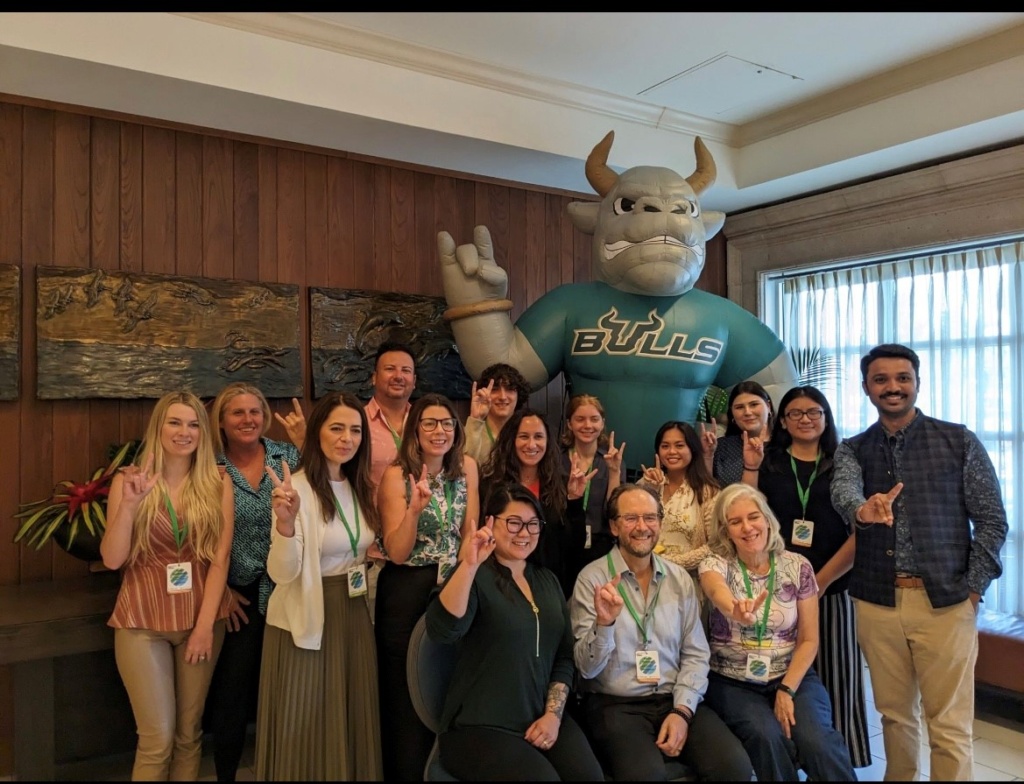News
Become an AASM member
Join the AASMWednesday, 5 June 2024
North American Social Marketing Conference 2024 – A Dose of Hope: Uniting Minds and Inspiring Change
Reflections from Rebecca Ahern, Executive Manager, Social Marketing & Communications Group, VicHealth

I had the privilege to meet an amazing bunch of social marketing professionals and academics at the North American Social Marketing Conference 2024 (NASMC), who generously shared innovative strategies for addressing critical social issues and new social marketing thinking. This year’s theme, A Dose of Hope: Uniting Minds, Inspiring Change, delivered on its promise, blending research presentations, interactive sessions, and networking opportunities. The collective passion, determination, and innovative thinking driving social change from across the globe left me inspired.
Four key themes resonated with me: neuromarketing’s potential beyond commercial applications, the importance of systemic change, the role of AI in social marketing, and the power of lived experience.
1. Neuromarketing Isn’t Just for Commercial Marketers
Neuromarketing’s potential to drive social change extends far beyond consumer marketing, leveraging techniques like functional magnetic resonance imaging (fMRI) and electroencephalography (EEG) to uncover subconscious processes influencing behaviour. These insights can enhance public change campaigns, educational strategies, and social programs by crafting more compelling messages for issues like addiction, environmental conservation, and mental health. Despite this potential, current communications strategies often fail to impact attitudes and behaviour, relying on the flawed assumption that awareness leads to care and changed behaviour. As Victor Strecher from the University of Michigan notes, people often disregard issues like climate change, believing the harm won’t affect them. This is because 98% of brain activity happens below consciousness, with numerous cognitive biases influencing decisions.

Sharyn Rundle-Thiele, Founding Director of Social Marketing at Griffith University and Editor-in-Chief of the Journal of Social Marketing, built on this adding the need for social marketing to adopt a faster pace, mirroring commercial marketers by failing fast and continually evaluating. Instead of spending 12 months planning, we need quicker, more effective solutions, evaluating throughout rather than only at the program’s end. It’s crucial to involve the right people early in the planning process, then swiftly implement the plan, as exemplified by a successful 16-week battery campaign. Being deliberate about what, who, and how we plan and execute can bridge the gap between scholarship and practice, ensuring that strategies are developed, executed, and evaluated by teams who understand the complexities of human decision-making.
2. AI for Good: Harnessing Technology in Social Marketing
Artificial Intelligence (AI) was a hot topic that sparked numerous ideas. Speakers like Amelia Burke-Garcia and Dr. Rebecca Soskin Hicks showcased how AI, through chatbots and digital opinion leaders, can enhance engagement and disseminate evidence-based information. They demonstrated how AI can tailor health messages to resonate with diverse audiences, combat misinformation, and foster authentic connections. It’s clear that AI has the potential to revolutionise how we communicate health messages, making them more empathetic and trustworthy.
3. Systemic Change: Beyond Individual Behaviour
The theme of systemic change emphasised the need to address the root causes of social issues rather than just individual behaviour. Discussions highlighted the solidarity economy as a sustainable alternative to exploitative models, advocating for supportive legal frameworks and public policies that promote economic justice and sustainability. This approach reinforced that lasting social impact requires broad, system-level changes and inspired us to aim for systemic transformation. Resilience, often celebrated as a virtue, is increasingly seen as problematic because it fails to address deeper systemic issues. For example, in mental health, increased awareness has sometimes exacerbated problems, as seen in a UK case study where awareness campaigns led to more reported mental health issues. Highlighting the delicate balance needed; strategies must not inadvertently feed the problem. A more effective approach involves incorporating people with lived experience from the beginning, ensuring solutions are grounded in real-world needs. Change requires both systems and individual behaviour adjustments, ideally addressing systemic issues first, but often necessitating a dual approach to achieve lasting, meaningful change.
4. Lived Experience: The Heart of Effective Social Marketing
A key theme was the importance of incorporating lived experience into social marketing from the start. Those directly affected offer invaluable insights that enhance interventions. Allowing them to connect and heal is crucial, as you can’t be what you don’t see. This co-creation leads to authentic, culturally sensitive programs, bringing credibility, humanizing efforts, fostering connection, and reducing stigma.
For instance, the “Stick it to Hep C” campaign by Health New Zealand, effectively challenged stigma by involving a diverse group of people with lived experience. The campaign targeted 45,000 people unaware they had Hep C, promoting awareness and understanding while combating stigma. It used bold, culturally sensitive messaging that resonated with audiences, empowered health professionals, and had medical peer endorsement. This approach showed that stigma needs unique, fact-based strategies and can be addressed effectively. Integrating people with lived experience in planning from the beginning—not just testing—ensures authenticity and relatability, resulting in a more comprehensive approach.
Conclusion
The North American Social Marketing Conference 2024 highlighted innovative approaches to tackling complex social challenges. I left inspired, equipped with new tools, and ready to collaborate with new colleagues to drive social change. Thanks to the Social Marketing Association of North America (SMANA) and the University of South Florida team for putting on such a great event.